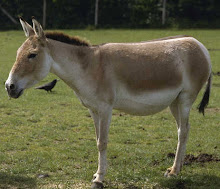Earlier this week I was fortunate to attend a lunch discussion on human rights in Kazakhstan. The speakers were four human rights activists currently in the United States through a U. S. State Department program. An hour isn't a very long time to cover such a huge and serious topic, so none of the questions could be answered in depth. In short, the guests said that:
1. the Communist era offered significantly more human rights -- as long as you were a Party member or sympathizer, and exercised your rights in alignment with the Party's interests;
2. significant improvements in human rights were legislated in the first years after independence, however human and citizen rights have largely been rolled back since then;
3. Central Asia is unlikely to duplicate western-style democracies, but could develop their own true democratic structures;
4. the government has two faces: the successful business-oriented democratic face it presents to the outside world, and a more oppressive face turned toward its citizens;
5. the personal safety of opposition activists is tenuous (citing the kidnapping allegations against Rakhat Aliev, and the murder of Altynbek Sarsenbayev);
6. they pursue human rights goals, and risk the dangers, for their children's futures, and because it feels right to help people. As one speaker said, "If I don't achieve our goals in my lifetime, my son will take up the fight. And after him, my grandson."
The delegation visiting the United States includes:
- Anara Ibrayeva, Kazakhstan International Bureau for Human Rights and Rule of Law, Astana Office Director; lawyer
- Marzhan Aspandiyarova, Nagyz Ak Zhol Democratic Party, Almaty City Branch Chair; "Save Our Homes" housing protection organization coordinator; journalist
- Murat Telebekov, The Muslim Committee for Human Rights in Central Asia, United Muslims of Kazakhstan, Director; journalist
- Yuriy Gussakov, Kazakhstan International Bureau for Human Rights and Rule of Law, Karaganda Regional Office Director
One encouraging note for those who follow Central Asian politics -- while the speakers said that news from the region, in newspapers and via the Internet, was biased and one-sided, I discovered that I was, in fact, already familiar with amost all of the issues discussed, thanks to news alerts and my RSS reader.
Coverage from sites like Radio Free Europe/Radio Liberty, Registan, newEurasia, KZBlog, Eurasia.net, and a host of smaller sites, really is a good way to keep abreast of current events not found in popular media (US, EU or KZ), and certainly not to be found in official government sources.





No comments:
Post a Comment